

SPECIAL EDITION MARCH 2025

Faculty of Informatics & Design
Faculty of Informatics & Design

Editor-in-chief
Professor Tembisa Ngqondi
- FID Dean
Editor
Philani Nombembe nombembep@cput.ac.za
News editor Jim Mohlala mjimarrow@gmail.com
Submit story ideas to nombembep@cput.ac.za or mjimarrow@gmail.com no later than the 15th of every month.
Faculty of Informatics and Design
FID celebrates landmark PhD graduations A celebration of excellence and impact
Dr Denise Lakay sets sights on research after earning PhD
Dr Odwa Gazana’s PhD journey paved with sacrifices, loss, and innovation
Dr Rylyne Nchu earns PhD, aims to boost ICT TVET education and job creation
PhD study proposes framework for smart water meter adoption
Dr Waldon Hendriks completes ICT PhD, boosting IoT research and industry collaboration
Late PhD graduate Patrick Mwansa honoured for electoral trust system
PhD study explores posthumanism and Ubuntu in South African graphic design
Veda Naidoo honoured for role in FID robing ceremonies
Faculty of Informatics & Design
Faculty of Informatics & Design
Editorial
This special edition of FID Pulse marks a significant milestone for the Faculty of Informatics and Design (FID), as seven PhD candidates graduated during the December ceremony. Their achievements reflect the faculty’s growing research impact.
Dean Professor Tembisa Ngqondi commended the graduates for strengthening FID’s academic standing, while Vice-Chancellor Professor Chris Nhlapo encouraged them to use their expertise to build a better South Africa. Their research tackles critical
issues, from environmental sustainability to higher education performance and economic growth.
Dr Odwa Gazana, who lost his father and brother during his PhD journey, developed an app to address e-waste in rural areas. Dr Denise Lakay’s research introduces automation to enhance student performance tracking in universities. Dr Rylyne Nchu’s work focuses on equipping ICT TVET graduates with entrepreneurial skills, improving employability and innovation. Each graduate’s journey
demonstrates the dedication, sacrifice, and resilience required to complete a PhD. Their research not only expands knowledge but also delivers practical solutions benefiting industries, communities, and academia.
This edition shares their stories, highlighting the impact of research and the importance of perseverance. As FID continues to grow, these graduates set an inspiring example for students and researchers alike.
Congratulations to our newest PhDs — your achievements
FID CELEBRATES LANDMARK PHD GRADUATIONS A CELEBRATION OF EXCELLENCE AND IMPACT
By Philani Nombembe
The Faculty of Informatics and Design (FID) marked a significant milestone during the summer graduation, with seven PhD candidates receiving their doctoral degrees.
The graduates were capped on December 12, 2024. FID Dean, Professor Tembisa Ngqondi, said the graduates flew the faculty’s flag.
“These graduates have put FID on the map,” said Ngqondi.
“Their dedication and hard work have not only contributed to the body of knowledge in their respective fields but have also elevated the faculty’s standing in academic and
professional circles.”
Ngqondi said she was happy that FID graduates’ research addressed real-life issues.
Writing in the graduation book, Vice-Chancellor Professor Chris Nhlapo urged graduates to contribute towards a better South Africa.
“I hope that you continue to create value wherever you go, dream big, and do something worthwhile with your precious qualification. Your community and South Africa need you now, more than ever,” said Nhlapo.
“Do not forget us; you are part of the CPUT family, and the
institution needs your continued contribution, whether it be through a formal structure like Convocation, or by employing our graduates.
“Finally, I would like to thank the university staff, your parents, guardians, family members, spouses, friends, donors and all stakeholders who have contributed to your success. This has truly been a collaborative effort, and their contribution is celebrated as well.”

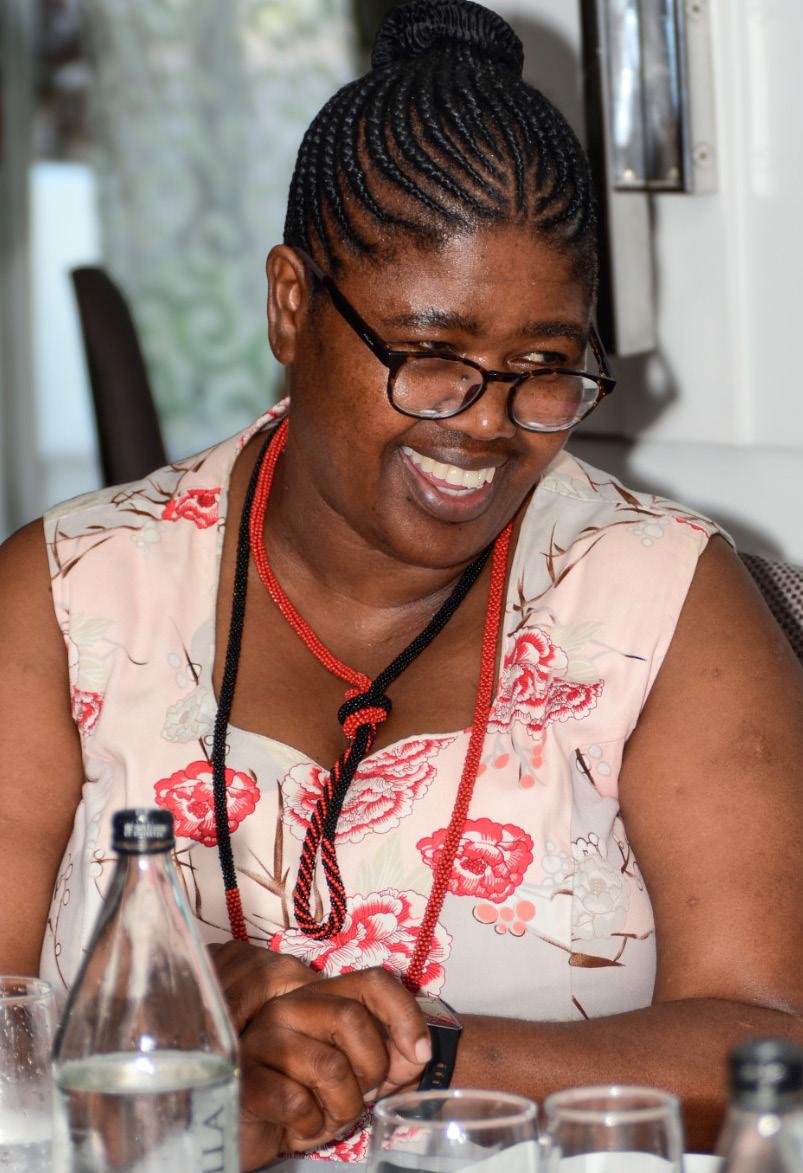
inspire us all.
Jim Mohlala News editor
FLYING THE FLAG: FID Dean Professor Tembisa Ngqondi said the graduates put the faculty on the map. Picture: Supplied.
Dr Odwa Gazana’s PhD journey
paved with sacrifices, loss, and innovation
By Jim Mohlala
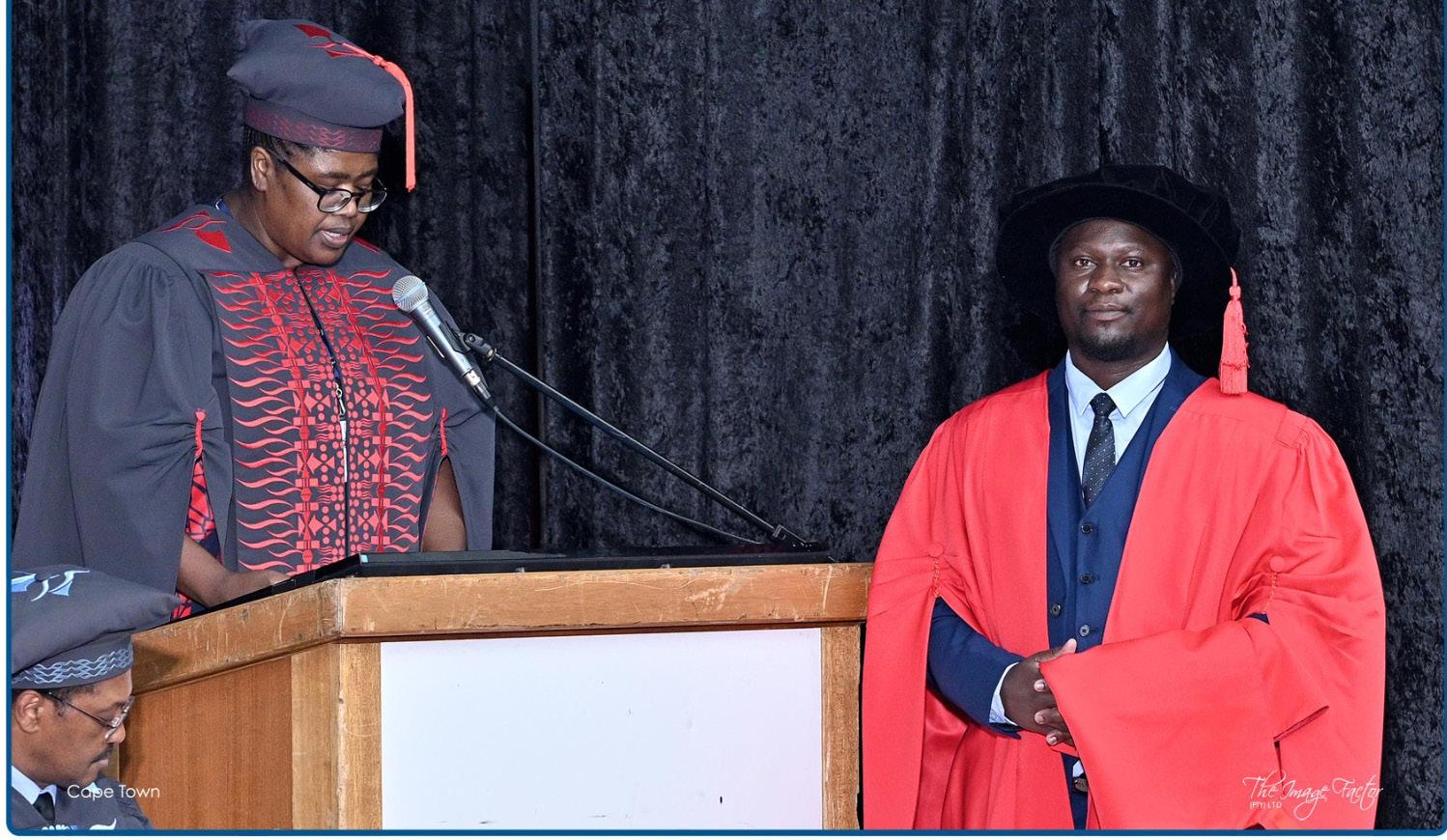
HARD-EARNED SUCCESS: Dr Odwa
Sacrificing family time and enduring sleepless nights finally paid off for Dr Odwa Gazana when he was awarded his PhD at the December graduation.
Gazana was one of seven doctoral graduates from the Faculty of Informatics and Design (FID). He said the sacrifices were worth it. Gazana graduated with a PhD in Informatics.
“Personally, it’s a great achievement. The journey required significant sacrifices, including time away from family. But it helped me develop problem-solving and critical-thinking skills,” he said. “Professionally, a PhD opens doors in higher education, allowing me to give back and inspire those who aspire to make a difference.”
Gazana’s research focuses on addressing electronic waste (e-waste) in rural areas.
“E-waste poses serious environmental and health risks if not properly managed,” he said. To help combat the challenge, he developed an app called The Lord of all Electronic Devices (TLED), designed to improve e-waste management and raise awareness of its dangers.
“The app allows users to register their old devices for collection instead of discarding them in
Dr Denise Lakay sets sights on research after earning PhD
By Philani Nombembe
Earning a PhD after 25 years in higher education was no small feat for Dr Denise Lakay.
A senior lecturer in the Department of Information Technology at Cape Peninsula University of Technology, Lakay was among the Faculty of Informatics and Design graduates capped in December. Now, she is setting her sights on a future in research.
“Achieving a PhD is a personal milestone after more than two decades in academia,” she said.
“He made research enjoyable,” she said.
landfills,” he explained.
He said many people were unaware of the risks associated with e-waste until he shared his research findings.
Gazana’s PhD journey was marked by personal loss.
“My father encouraged me to pursue a PhD, but at the beginning of 2024, he passed away. Before he died, he told me to finish my degree no matter what,” he said.
“After his funeral, I called my supervisor, Professor Tembisa Ngqondi (the FID Dean), to inform her I was deregistering. But she convinced me to continue, reminding me that my father was still with me in spirit.”
His challenges did not end there.
“A month after my father passed, my elder brother also died. Just before graduation, I lost my youngest brother too. But I thank God for giving me the strength to continue and for my supervisor’s support.”
Gazana urged aspiring PhD candidates to pursue their studies with passion.
“A PhD requires sacrifices, but it should also be an enjoyable journey. Don’t do it for status or money — let passion drive you, and everything else will fall into place.”
“Once I became a senior lecturer, I realised that a PhD was essential. The journey has shaped me as a researcher, shifted my thinking, and proven that sacrifice pays off.”
Lakay’s research focuses on designing a robotic process automation-based system for assessing academic performance in South African universities. She hopes her findings will help improve the way higher education institutions track student success.
“One of the real challenges heads of departments face is producing accurate academic performance statistics,” she explained. “My study aims to generate timely information to help senior academics take remedial action early in the academic year.”
Her role as a curriculum officer and a teaching and learning representative for the IT department means she is in a position to apply her research directly.
“Understanding academic performance from both a student and staff perspective changes how I approach meetings with student representatives and colleagues,” she said.
“I can now implement what I’ve learned, whether in curriculum planning, domain leadership, or teaching research methodology and supervising projects.”
Lakay credits her supervisor, Professor Tiko Iyamu, with keeping her engaged throughout the process.
A JOURNEY OF PERSEVERANCE:
“His approach, the way he spoke about it, and our discussions motivated me. He always pushed me with deadlines. We had a weekly research forum and biannual workshops, and through these, we became more than just fellow students — we became friends. If someone missed a session or sounded down, there would be a follow-up call, even just to ask about our pets. Those connections made all the difference.”
Having colleagues pursuing their own Master’s and PhDs also encouraged her.
“There were nights when I felt stuck, but a quick Teams call reminded me I wasn’t alone,” she said. “When I thought about giving up, my family in Christ prayed for me and reassured me the end was in sight. My children were my biggest blessing — they did whatever they could to lighten my load so I could focus on my studies.”
For those considering a PhD, Lakay offers this advice: “Every journey is different, so don’t compare yourself to others. It’s a commitment, but only for a season,” she said.
“The sacrifices will be worth it in the end. Your family’s support is crucial, and you have to be open to a new way of thinking and writing. Embrace the challenges, and most importantly, enjoy the journey.”
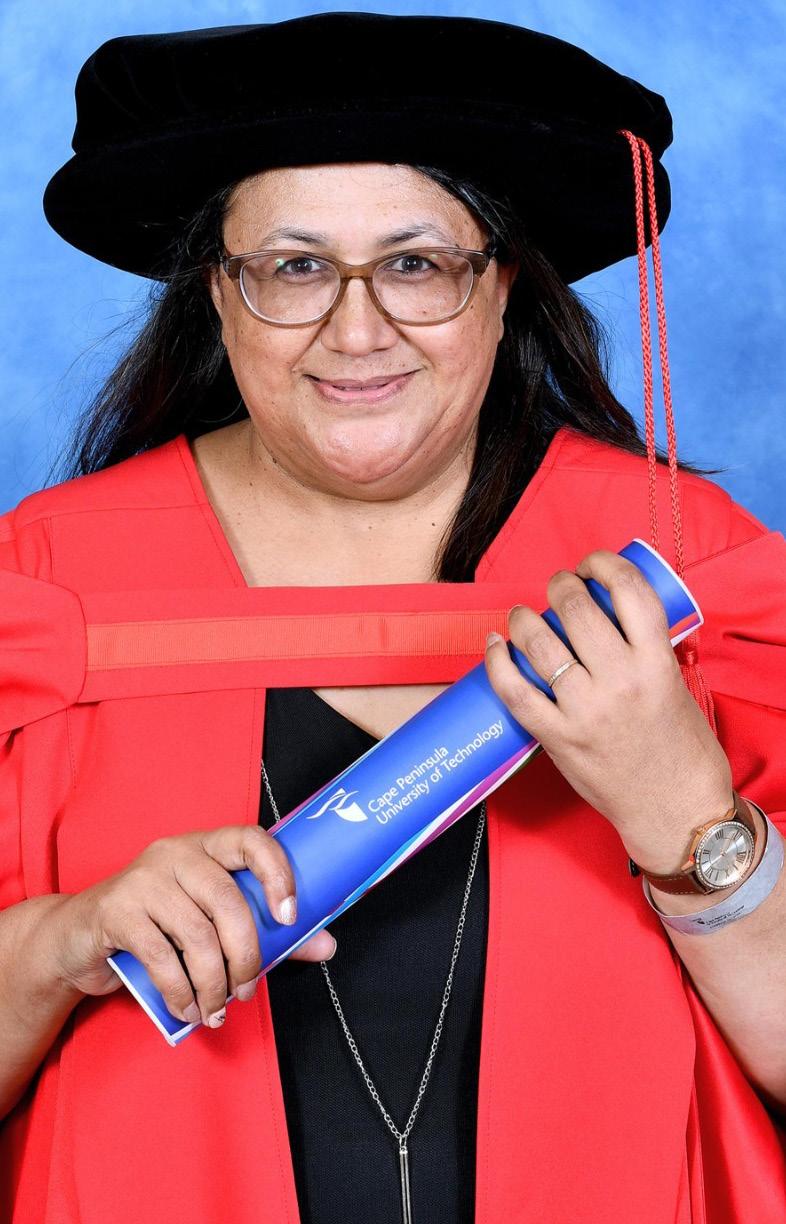
Gazana’s sacrifices paid off as he received his PhD under the supervision of FID Dean Professor Tembisa Ngqondi. Picture: Supplied.
Dr Denise Lakay celebrates earning her PhD. Now, she looks ahead to a future in research. Picture: Supplied.
Dr Rylyne Nchu earns PhD, aims to boost ICT TVET education and job creation
By Jim Mohlala
Dr Rylyne Nchu’s walk across the stage in the Major Sports Hall at the Bellville Campus during the December graduation marked the fulfilment of a childhood ambition and years of hard work.
Nchu, a lecturer in the Department of Entrepreneurship and Business Management at the Cape Peninsula University of Technology, obtained a PhD Informatics. She said the achievement was significant both personally and professionally.
“Personally, it has always been my dream to reach the highest academic level by obtaining a PhD. My PhD journey has contributed to my personal growth, resilience, and adaptability. I am more self-motivated, self-aware, and confident,” Nchu said.
“Professionally, earning my PhD means career advancement in academia, research, and industry. It has given me a competitive edge in my career and the job market. With a PhD, I can share my knowledge and experience
with students, foster research, and guide the next generation of scholars and professionals.”
Nchu said her research addresses real-life challenges.
“My research focused on developing an entrepreneurial skills acquisition framework for ICT (Information and Communication Technology) TVET (Technical and Vocational Education and Training) students. It tackles issues like youth unemployment, job creation, and innovation. By encouraging entrepreneurship, my research aims to help ICT TVET graduates reduce unemployment and poverty.”
She hopes her research will enhance job creation and graduate employability while fostering economic growth. Nchu noted that entrepreneurial skills could help ICT TVET graduates contribute to the economy through innovation and start-ups, making them more attractive to employers.
“I am currently applying my findings at my workplace,” she said.
“I lecture in entrepreneurship at a higher institution in Cape Town, providing practical experiences for my students. They can apply their entrepreneurial skills through projects, internships, and startup incubators. I collaborate with industry partners to ensure the entrepreneurial skills framework meets industry needs.”
Nchu described her PhD journey as a “unique and transformative experience.” One highlight was knowing that she contributed new knowledge to her field.
“Networking opportunities were also a highlight. Collaborating with peers, mentors, and experts while participating in conferences, workshops, and seminars allowed me to build valuable connections and friendships.”
She attributed her motivation to her passion for research and a supportive environment.
“My interest in my research topic kept me going, along with the encouragement from supervisors, colleagues, and family members.”
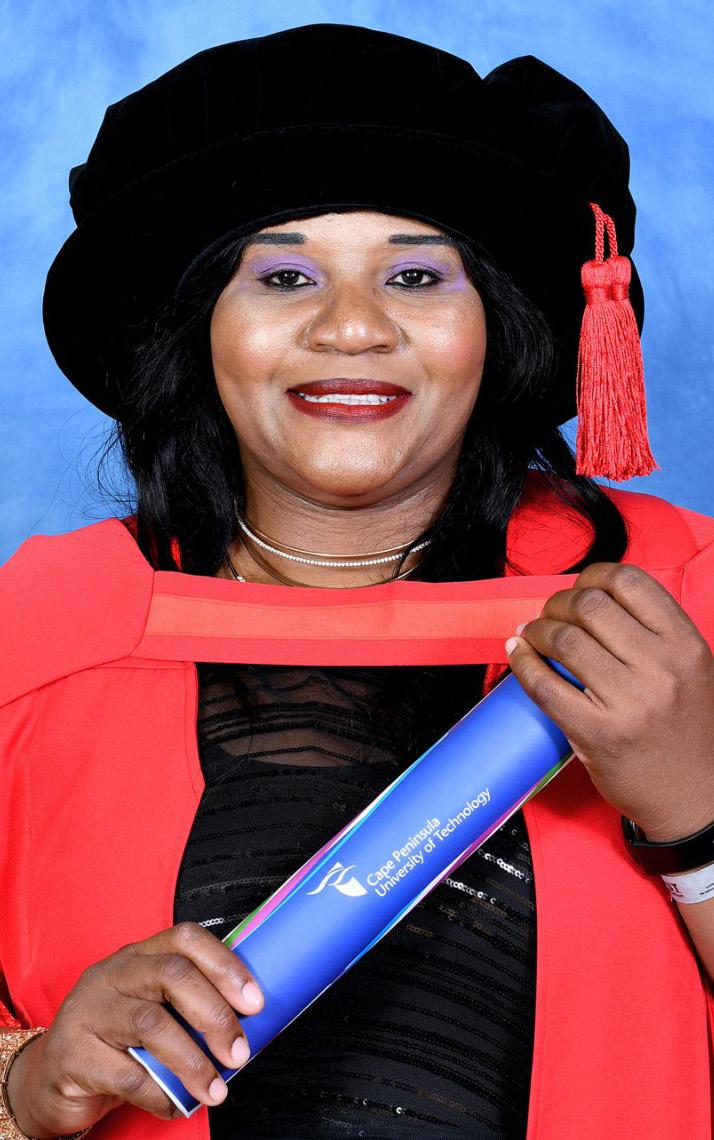
Nchu advised those considering or pursuing a PhD to ensure they are mentally, financially, and academically prepared.
“Understand why you want to pursue a PhD, find the right supervisor, and be ready for challenges, as the journey can be demanding both intellectually and emotionally,” she said.
“Stay focused, network, and collaborate with others. Stay motivated, be flexible, plan, and manage your time wisely. Above all, enjoy the journey.”
PhD study proposes framework for smart water meter adoption
By Jim Mohlala
Dr Nwakego Joy Okoli’s PhD research examined the slow adoption of Internet of Things (IoT)-based Smart Water Meter Systems (SWMS) by water management institutions, despite inefficiencies in traditional methods. Supervised by Dr Boniface Kabaso, her study, A Sustainable Information System Framework for the Adoption of a Smart Water Meter System, identified key barriers to SWMS adoption. These included technological constraints
such as unreliable internet and electricity, high costs, limited government support, security concerns, and a lack of stakeholder knowledge.
To address these challenges, Okoli developed a sustainable information system framework. She introduced three key constructs: economic factors, stakeholder knowledge gaps, and trialability— the need for pilot studies before large-scale implementation. Her framework builds on the technol-
ogy-organisation-environment (TOE) model, offering guidance for policymakers and water utilities in Africa and other developing regions.
“The slow uptake of smart water technologies is not just a technical issue but a systemic one,” the graduation book reads.
“By addressing economic barriers, improving stakeholder knowledge, and conducting pilot studies, we can create a more sustainable and efficient water
management system.”
Okoli shared her findings through academic publications, including a presentation at the 2023 International Conference on Artificial Intelligence and its Applications and an article on the role of IoT in building smart water cities.
DREAM REALISED: Dr Rylyne Nchu fulfilled a childhood ambition when she earned her PhD in Informatics at the December graduation. Picture: Supplied.
Dr Waldon Hendriks completes ICT PhD, boosting IoT research and industry collaboration
By Philani Nombembe
Dr Waldon Hendriks’ family is relieved that he has finally completed his PhD.
A first-year programme coordinator in the Information Technology Department at Cape Peninsula University of Technology, Hendriks graduated with a PhD in Information and Communication Technology in December 2024. He described the journey as “bumpy.”
“Earning my PhD has been a challenging journey,” he said.
“For my family, it’s a relief because when you pursue a PhD, you disappear into research, and they have to accept that. You have to complete the journey to come out. Professionally, it is a milestone that strengthens my ability to bridge the gap between academia and industry, opening doors for impactful research and collaboration.”
Hendriks’ research focuses on improving Internet of Things (IoT) network protocols to enhance efficiency and security.
“By developing frameworks for se-
lecting optimal network protocols, I aim to improve data transmission reliability and address resource constraints,” he said. “This research can support IoT applications in areas such as healthcare, smart cities, and environmental monitoring. Potential uses include smart bins, water conservation tracking, flood safety alerts, and community weather stations.”
Hendriks is already applying his research in collaboration with Vodacom.
“We are exploring the use of NBIoT SIM cards with SIM control on Vodacom’s network to improve communication,” he explained.
“We also provide third-year and postgraduate students with hands-on experience using Raspberry Pi and Arduino to develop IoT solutions, ensuring they graduate with practical industry skills.”
One of the highlights of his PhD journey was mentoring the South African Network Track team to a first-place victory at the Huawei ICT Competition 2022-2023 Global Final in Shenzhen, China.
“This achievement validated the practical impact of my research and mentoring,” he said.
Hendriks credited his PhD supervisor, Dr Boniface Kabaso, with keeping him focused.
“During tough times, he reminded me that my PhD research had to come first. I had to prioritise it over the ICT competition,” he said.
“But my wife, Stephia Hendriks, was my greatest pillar of support. Her faith in my vision helped me push through setbacks.”
Hendriks participated in the Teaching Development Programme with the Fundani Centre for Higher Education Development. His efforts were recognised when he was named a recipient of the 2024 Faculty and Institutional Teaching Excellence Award for early-career academics.
Hendriks advised aspiring PhD candidates to “choose a research area that excites you — passion will keep you going through obstacles”.
“Build a strong support network of
Late PhD graduate Patrick Mwansa honoured for electoral trust system
By Jim Mohlala
Dr Patrick Mwansa was awarded a PhD in Informatics posthumously. His research focused on developing a trust system framework for integrity controls in electoral vote counting and validation, addressing challenges in both traditional and electronic voting systems, including mistrust, security flaws, and lack of transparency. These issues contribute to losses, miscounts, fraud, and manipulation.
Supervised by Dr Boniface Kabaso, Mwansa developed a blockchain-based artefact for counting votes and validating them. This system used symmetric cryptography and edge computing to enhance electoral transparency, security, and trust.
According to the graduation book, “By applying the Byzantine General Problem and Byzantine Binary Agreement protocols within
consensus algorithms, his solution enhanced security and trust in decentralised voting environments.”
Mwansa adopted a pragmatic research philosophy and employed the design science research methodology. His approach combined quantitative and qualitative methods, using questionnaire data to define system specifications and historical election results to evaluate performance.
mentors, peers, and family,” said Hendriks.
“Accept failure as part of the learning process, and stay open to evolving your ideas. The journey is as much about personal growth as it is about academic achievement.”

The blockchain-based vote validation system underwent iterative testing and refinement to ensure its effectiveness in real-world electoral scenarios.
His research resulted in four published papers and a presentation at the 2023 International Conference on Artificial Intelligence and its Applications.
PERSISTENCE PAYS OFF: Dr Waldon Hendriks celebrates earning his PhD in Information and Communication Technology after a challenging journey. Picture: Supplied.
PhD study explores posthumanism and Ubuntu in South African graphic design
By Philani Nombembe
Dr Katarzyna Anna Chmela-Jones earned a PhD for her study on the role of human-centred graphic design in a posthumanist context. She was supervised by Professor Johannes Cronjé and Dr Bruce Snaddon. Her research examined the influence of posthumanism and Ubuntu philosophies on graphic design in South Africa.
According to the graduation book, six key dimensions were identified as critical to this transformation: relationality, visceral engagement, more-than-human agency, hybrid identities, Ubuntu-informed ethics, and moving beyond anthropocentrism. These elements advocate for a more inclusive and sustainable approach to design.
The study proposed solutions such as interdisciplinary collaboration, technological integration, and continuous learning. It also highlighted Ubuntu’s emphasis on interconnectedness, empathy, and social justice as complementary to posthumanist principles in fostering inclusive and socially responsible design.
Veda Naidoo honoured for role in FID robing ceremonies
By Philani Nombembe
Faculty of Informatics and Design’s (FID) postgraduate officer Veda Naidoo has been recognised with a special gift for her role in organising the faculty’s graduation robing ceremonies.
At the December ceremony, former FID Dean Professor Johannes Cronjé presented Naidoo with an angavastram, a traditional Indian garment given to honoured guests. Cronjé, who stepped down as dean in 2021, said the gift was a token of appreciation for her years of support in organising the event.
Reflecting on the origins of FID’s robing ceremony, Cronjé explained that many universities allow staff members who are parents to place the hood on their graduating children. He had done so himself when his daughter obtained her BTech at Cape Peninsula University of Technology.
However, the university later discontinued the practice due to uncertainty over eligibility criteria. “I argued that all staff, not just academics, should be included, but the decision was made to end it entirely—partly out of fairness to parents who were not university staff,” he said.
To create an inclusive way for families to be involved in graduation, FID introduced a formal gathering before the ceremony, such as a dinner, lunch, or breakfast.
“During these gatherings, the supervisor introduces the graduate and reflects on their postgraduate journey. The significant other and the supervisor then robe the graduate, who has an opportunity to share their experiences and express gratitude,” Cronjé said.
The angavastram he received in India as a keynote speaker inspired him to honour Naidoo in a similar way.
“In India, guest academics, dignitaries, and honoured guests are traditionally presented with an angavastram — a robe made from ornate fabric, draped over the shoulders as a mark of respect,” he said.
“I was deeply moved by the gesture and felt compelled to share the experience with Veda, my long-time partner in arranging FID’s robing ceremonies. Given her South African-Indian heritage, the gift felt even more meaningful. She, who has robed so many over the years, was more than deserving of being robed herself.”
Naidoo described receiving the gift as a humbling experience.
“In India, a shawl is often given as a mark of respect, honour, and appreciation. It symbolises warmth and a connection between the giver and the receiver,” she said.
“In this context, I see it as a ges-
Chmela-Jones used a qualitative, phenomenological approach to explore the experiences of South African graphic designers. Her findings were published in a journal article, ‘Posthuman Communication Design in South Africa’, in Communicare: Journal for Communication Studies in Africa in July 2024.
ture of gratitude for my contributions, especially as Prof Cronjé and I have arranged and shared many special robing ceremonies over the years. It also represents inclusivity and how we, as a faculty, bring people together in shared celebration.”
Naidoo said the postgraduate robing ceremony was deeply symbolic.
“It marks the conclusion of years of dedication, perseverance, and hard work. Unlike the formal grad uation, which is a public event, the robing ceremony is more intimate and personal, where students’ academic achievements are recognised,” she said.
“More importantly, it is a time for reflection, gratitude, and celebration—not just for graduates but also for their supervisors and loved ones who have supported them. It builds a sense of tradition and belonging within our faculty.”
She acknowledged the complexity of organising the event.
“A successful robing ceremony requires meticulous planning and coordination. It involves securing the venue, arranging academic regalia, coordinating students and supervisors, preparing the proceedings, and ensuring a meaningful experience for graduates and guests,” she said.
“Attention to detail is key — whether it’s organising seating
arrangements or managing schedules. Ultimately, the goal is to create an event that truly highlights our master’s and doctoral graduates and their achievements.”
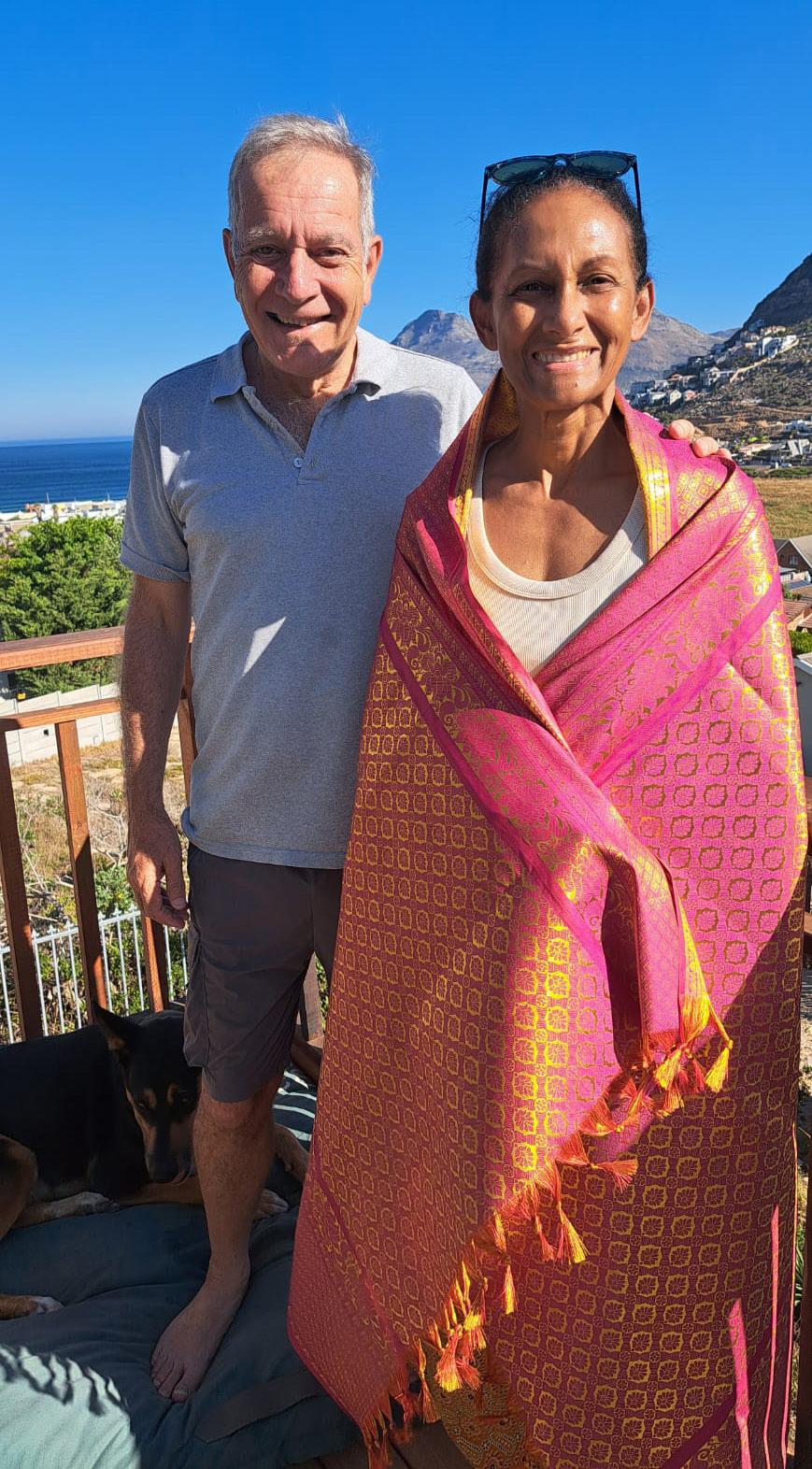
TOKEN OF APPRECIATION:
Former FID Dean Professor Johannes
presented postgraduate officer Veda
with a traditional Indian angavastram, a symbol of honour, for her role in organising the faculty’s graduation robing event.
Pictures: Supplied.
Cronjé
Naidoo
Applied Design
Fashion
Jewellery Design & Manufacture
Visual Communication Design
Product & Industrial Design
Design Post graduate studies
Design Foundations ECP
Head of Departments
Dr Monica Di Ruvo
diruvom@cput.ac.za
FID Assistant Dean & Acting Research Coordinator
Architectural Technology and Interior Design
Architectural Technology
Interior Design
Architectural Technology & Interior Design (ECP)
Prof Masilonyane Mokhele
Mr Rayner Moodley
Urban & Regional Planning
Information Technology & Multimedia
Urban & Regional Planning
Higher Certificate: Information & Communication Technology Service Management
Information & Communication Technology: Applications Development
Information & Communication Technology: Communication Networks
Information & Communication Technology: Multimedia Applications
BTech and Advanced Diploma in Information & Communication Technology
Post Graduate Studies
ICT Academy
Media and Communication
Film & Video Journalism
Photography Public Relations Management
Mr Brian Fisher-Holloway
(Acting HoD)
Dr Tabisa Ncubukezi
MokheleM@cput.ac.za
HOD-ATID@cput.ac.za
fisherhollowayb@cput.ac.za
NcubukeziT@cput.ac.za
Prof Nirvana Bechan
bechann@cput.ac.za
